Home » Jazz Articles » Big Band Caravan » Vaughn Wiester / Doncaster Jazz Orchestra / Kluvers Big ...
Vaughn Wiester / Doncaster Jazz Orchestra / Kluvers Big Band / Mike Holober & the Gotham Jazz Orchestra
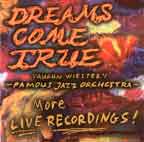 Vaughn Wiester's Famous Jazz Orchestra
Vaughn Wiester's Famous Jazz OrchestraDreams Come True
COJazz
2009
If you're going to dream, you may as well dream big, in glorious Technicolor with stereophonic sound. As Vaughn Wiester knows, there are times when Dreams Come True. Wiester's vision of leading his own big band is a reality, as is his dream of recording the band in concert—not once but four times. Persuading the legendary Bill Holman not only to provide two compositions for his latest CD, but to conduct one of them too, is a hope perhaps beyond the reach of most dreamers, but Wiester has achieved that one as well. Dreams marks the debut of Holman's buoyant "Theme and Variations 3," conducted by the composer, and the first performance in many years of his genial "Boo Boo Be Doop," written in the early 1950s for the Stan Kenton Orchestra.
Wiester also prevailed upon composer Bill Mathieu to write a dedication to Holman, "The Whole Man," and Mark Lopeman to frame a concert version of John Carisi's "Springsville" based on the classic Gil Evans arrangement. Joe Coccia weighed in with a pair of his luminous charts, "Love Letters" and "Walkin' by the River," written for the Kenton Orchestra in 1957. Completing the seductive program are Gene Roland's groovy "Wailin' in the Woodshed," Frank Foster's out-of-tempo arrangement of "Make Someone Happy" and Holman's impassioned "Prez Conference" (all written for the Woody Herman Orchestra); Sammy Nestico's delicious "Orange Sherbet," from the Count Basie book; John Hall's charming yet rarely heard "Dearly Befuddled," Clevelander Paul Sequence Ferguson's smoothly flowing "Mon Ami Jobim," and a pair of classic Thad Jones originals, "The Interloper" and "Rhoda Map."
Marvelous music, no doubt about that—as there can be no doubt that the peremptory question is, how does it sound when played by Wiester's Famous Jazz Orchestra (named, one presumes, with tongue firmly in cheek). In a word: sensational. Wiester has kept the band alive and burnin' for more than a dozen years, and the experience is paying dividends. The ensemble is snug and sturdy, the rhythm section eager and emphatic, the soloists sharp and enterprising. Flugel Jim Powell is showcased on "Springsville," tenor Bryan Olsheski on "The Whole Man," Jay Miglia on alto ("Love Letters") and soprano ("Rhoda Map"). Wiester solos once (muted), with Powell and guitarist Derek DiCenzo on "Orange Sherbet." Other soloists of note are trumpeter Larry Everhart, alto John Vermeulen, tenor Joe Graziosi, trombonist Matt Ellis, pianist Jim Luellen and bassist Larry Cook.
A few more albums of this caliber and the FJO may yet live up to its extravagantly optimistic name. If that seems like a stretch, remember that there are sometimes unforeseen circumstances in which Dreams Come True.
 Doncaster Jazz Orchestra
Doncaster Jazz Orchestra
And Friends
DYJA
2009
Before going further, let us quickly gather some medals of honor and pin them securely on the chests of director John Ellis and the members of the UK's Doncaster Jazz Orchestra, who have been making beautiful music together for more than thirty-five years (with, of course, the inescapable changes in personnel brought about by the passage of time). That's quite a span—probably well over a century in big-band years—and if one wishes to know more about how it has happened, he or she need only listen attentively to the orchestra's newest CD, recorded at the famed Abbey Road Studios in London. This is, not to mince words, one stupendous group of young musicians, several of whom are graduates of the ensemble's "farm team," the Doncaster Youth Jazz Orchestra.
Some of the DJO's alumni have gone on to fashion rewarding careers as in-demand jazz musicians, and five of them agreed to return as guest artists on this album. The quintet is comprised of trumpeter Mark Whitecage, trombonists Pete Beachill and Dennis Rollins, baritone saxophonist Dean Nixon and pianist Andy Vinter. Each one performs brilliantly, as soloists and sometime members of the ensemble. White is showcased on Richard Evans' "Keep on Keepin' On," Beachill on Vinter's "A View from the Hill," Rollins on Paul Hartsaw's "Blues fur Elise" (sorry, Ludwig) and with Nixon on Paul Higgs' "Half-Steps," Vinter on "Hill," "Half-Steps" and "Keepin' On."
Not to be outdone, the DJO unsheathes several admirable soloists of its own. Trumpeter Sean Hollis is featured on "You Stepped Out of a Dream," tenor Ben Mallinder on Bob Florence's "Autumn," flugel Reuben Fowler on Bobby Shew's "Blue," trombonist Chris Groves on Sammy Nestico's "The Plunger." There is one vocal, by Anya Thompson (one of the ensemble's four eighteen-year-olds) on Cole Porter's "Easy to Love." Other creative improvisers include alto / soprano Mark Ellis, trombonist Stuart Garside, tenor Sarah Potts, trumpeters Tom Tait and Simon Nixon, pianist Matthew Robinson, guitarist Paul Grady and drummer Ian West. Good as they are (and they are good), the ensemble is what repeatedly captures and engages one's ear as it scurries through the various charts with equal parts enthusiasm and self-assurance.
Rounding out the tantalizing program are Oliver Nelson's undulating "Stolen Moments," McCoy Tyner's picturesque "African Village," James Hamilton's emphatic "The Jig Is Up" and Les Hooper's assertive "Back in Blue Orleans." Needless to say, the DJO easily nails every one of them. Thirty-five years old and growing stronger. Long live the DJO.
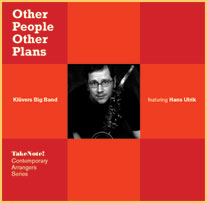 Kluvers Big Band
Kluvers Big Band
Other People Other Plans
Music Mecca
2009
Unless you follow the European jazz scene closely, chances are you've not been introduced to saxophonist Hans Ulrik whose forward-leaning compositions are showcased on the Kluvers Big Band's latest album, Other People Other Plans. Ulrik wrote and solos on all eight selections, seven of which were arranged by trumpeter Jesper Riis, "Other People" by David Springfield.
One complaint often leveled against cutting edge composers is that their themes don't swing. In many cases the accusation rings true. Happily, Ulrik's compositions are for the most part exceptions to the rule. In other words, most of them evince a sturdy rhythmic pulse, while several (notably "Tossing and Turning," "Broad Arrow," "No Nonsense," "Ramble On") swing as robustly and as often as one could desire. It helps, of course, to have at one's disposal a band as sharp and talented as Jens Kluver's Denmark-based ensemble, which could make reading the yellow pages sound awesome.
Besides being a splendid writer, Ulrik is a resourceful soloist on soprano or tenor sax, employing the former on "Fish in the Water," "Broad Arrow" and "Message Returned." The band answers with some capable ad-libbers of its own including Riis, flugel Jakob Buchanan, alto saxophonist Niels Lokkegaard, tenor Michael Bladt, trombonist Nikolai Bogelund, guitarist Soren Bo Addemos, pianist Mads Baerentzen, bassist Morten Rasmbol and drummer Espen Laub von Lillienskjold.
Other People Other Plans was recorded live at The Concert Hall, Aarhus, but there's scant evidence of that except for an occasional sprinkling of applause. Audience reaction was expunged from the end of each selection save the last, "Message Returned." Ulrik, who leads his own small groups in Denmark, had performed with the KBB before but this marks the first time he has composed for the ensemble. It's an impressive coming-out party, one in which Ulrik reveals himself as a composer and player who bears close scrutiny.
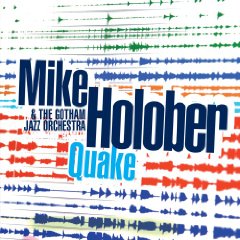 Mike Holober & the Gotham Jazz Orchestra
Mike Holober & the Gotham Jazz Orchestra
Quake
Sunnyside
2009
On Quake, his third recording with the New York-based Gotham Jazz Orchestra, composer / arranger Mike Holober earns high marks for inventiveness. Holober's assortment of seven tone poems is multi-hued and generally engaging, not to mention well-performed by the urbane GJO. For comparison's sake only, contemporary writers plowing roughly parallel fields include Maria Schneider, Bob Brookmeyer, Ed Partyka, Carla Bley, Fred Stride, George Gruntz, Eliane Elias and Ed Sarath, among others.
If there are caveats, they are that, lovely as it is, a good part of the music is relatively sedate, and that some of it is so drawn out as to overstay its welcome and cause one's attention to wander. "Ruby Tuesday" shuffles along for more than 13 minutes, "Roc & a Hard Place" for more than 11, while four other tracks surpass the nine-minute mark. "Twist & Turn," at just short of eight minutes, is the briefest. On the other hand, Holober, as noted, is a first-rate composer, and many may find the placidity and duration of his themes rewarding. As for the album's title, Holober explains that Quake represents "the sound leaves make when they rustle in the wind, especially in the fall when they are dying and colorful, particularly if they are aspens." In other words, Quake isn't meant to rouse visions of the earth trembling beneath one's feet or volcanoes spewing lava on an unsuspecting populace.
The various soloists, all of whom are impressive, are listed on the inside of the tray (beneath where the disc itself lies), and one has to look hard to find their names. Alto Dave Pietro is featured on George Harrison's "Here Comes the Sun" and with Holober on "Note to Self." Others who seize the moment include trumpeters Scott Wendholt and Joe Magnarelli, saxophonists Tim Ries and Jon Gordon, trombonists Pete McGuinness and Mark Patterson, guitarist Steve Cardenas and bassist John Hebert. John Riley is the ensemble's unerring timekeeper. For those who admired Holober's debut recording, Thought Trains, this is an admirable second volume to enrich the library.
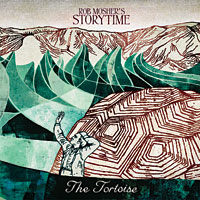 Rob Mosher's Storytime
Rob Mosher's Storytime
The Tortoise
Rob Mosher
2009
On The Tortoise, composer / arranger Rob Mosher wrests about as much warmth and color from a tentet as is humanly possible, drawing on his widespread musical influences to fashion a series of absorbing musical sketches whose temper and framework are classically oriented with a perceptible European veneer—hardly unforeseen for one who numbers Bach, Debussy and Ravel among his primary sources of inspiration.
While there are improvisations along the way, Mosher's essays are essentially through-composed to emphasize the charm and cohesion of the ensemble. And those who have seen tortoises in action will no doubt understand the import behind the title, as a sizable chunk of the music on offer ambles forward as deliberately as its namesake. Exceptions include the Latin-suffused "Sands of Maundune," pre-swing era "What Snowflakes Are Plotting," pugnacious "Tall Tales of Todd Toven," playful "1920s Car Chase" and parts of "On a Clear Day."
Mosher, who is presumably a transplanted Canadian (The Tortoise was recorded in Brooklyn, NY), plays soprano sax, oboe and English horn. Sharing the impressive front line are saxophonists Sam Sadigursky, Peter Hess and Brian Landrus, trumpeter Micah Killion, trombonist Michael Fahle and French hornist Rachel Drehmann, while guitarist Nir Felder, bassist Garth Stevenson and drummer Ziv Ravitz comprise an able-bodied rhythm section. The ensemble is exemplary, Mosher's charts are rich and seductive, and The Tortoise is worth pursuing (and catching), especially by devotees of tasteful chamber Jazz.
 Central Washington University Jazz Band 1
Central Washington University Jazz Band 1
In a Mellow Tone
Sea Breeze Vista
2009
Duke Ellington with a Count Basie point of view. That's the thought that leaped to mind while listening to the first two tracks on the Central Washington University Jazz Band 1's debut recording, In a Mellow Tone. The mood is underscored on "Mellow Tone" by guitarist Tarik Bentlesmani who does a respectable impression of Basie's longtime rhythm master, Freddie Green. Meanwhile, the ensemble plays with the power and insouciance of the Count's celebrated bands of yesteryear on the title selection and Ellington's "In a Sentimental Mood" before moving on to arduous compositions by Maria Schneider, Denny Zeitlin, Charles Mingus, Thelonious Monk, Fats Waller and Randy Aldcroft.
Director Chris Bruya's apprentices are bright-eyed and well-prepared, as is immediately evident on Schneider's labyrinthine "Wyrgly," nicely ushered in by drummer Matt Larsen's dexterous brushwork and muted trumpets. Zeitlin's pensive "Quiet Now," showcasing the reed section, is followed by Mingus' vibrant "Moanin'" (featuring Mark Claassen's agile baritone sax), Aldcroft's savory "Breakfast Wine," Waller's cheerful "Honeysuckle Rose" (vocal and scatting presumably by Susie Reese who also lends her voice to Jonathan Campbell's "Terra Rovinj") and Monk's irrepressible "Rhythm-a-ning," taken at a lively gallop. The album's final selections, "Terra Rovinj" and Martijn van Iterson's "The Whole Bunch," are crisply performed by CWU's five-member Jazz Combo 1.
Soloists aren't listed but one assumes that's Campbell holding forth on "Sentimental Mood," "Wyrgly," "Moanin'" and "Rhythm-a-ning," on which Bentlesmani also has some engaging moments. A large and pleasurable surprise from undersized Ellensburg, Washington.
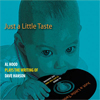 Al Hood
Al Hood
Just a Little Taste
Kakeda Music
2009
Alan Hood's Just a Little Taste isn't actually a "big band" album unless one numbers a ten-member string section as a part of the band. Otherwise, the Denver-based trumpeter is backed by piano, bass, drums, flute, oboe and French horn in a succession of lyrical themes designed to showcase his artistry against a backdrop of strings, winds and percussion.
This isn't really a "jazz" album either, even though there are concise improvisations on most numbers by Hood and on several by pianist Dave Hanson. There is one vocal, by Steve Hood, on "Here's to Life," and a guest appearance by Rich Chiaraluce (clarinet on "New Orleans," alto sax on "A Little Taste," tenor on Lee Morgan's "Ceora"). The album's subtitle, "Plays the Writing of Dave Hanson," is slightly askew in that the pianist wrote only four of the dozen numbers but arranged all of them.
Hanson's "Taste," on which he, Hood and Chiaraluce loosen the throttle, is by far the "jazziest" item on the menu and swings heartily even with the ever-present strings straining to apply the brakes. The remainder of the program is either balladic or temperate. This is beautiful music, superbly played by Hood and his colleagues, but it clearly isn't aimed toward hard-core Jazz or big-band fans. Rather, this is more along the lines of those romantic late-night albums by Jackie Gleason, Bobby Hackett, Percy Faith and others that were so popular many years ago. Easy listening but less than cerebral.
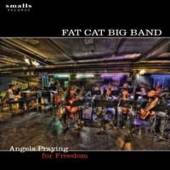 Fat Cat Big Band
Fat Cat Big Band
Angels Praying for Freedom
Smalls Records
2009
Okay, so not much was expected from a big-band CD whose title is Angels Praying for Freedom. It serves to prove how misleading assumptions can be. As the first bars of "Subway Soliloquy" uncoiled, the adage about not being able to describe a book by its cover sprang to mind. While Angels may not gladden everyone's ear, it is far less aberrant than anticipated. To the contrary, the lambent studio session is for the most part straight-ahead and harmonious, cleaving earnestly to long-established jazz tradition (in other words, free jazz it ain't).
All of the compositions and arrangements are by guitarist Jade Synstelien someone whose name is worth keeping in mind. He does his best to make the eleven-member ensemble sound like a full-fledged big band, and earns his spurs with a series of cogent and resourceful charts. There are, it must be noted, two egregious errors: Synstelien sets aside his guitar and chooses to sing on "Unfulfillable Longing" and "The Thing That We Play To" (the last with vocal support from bassist Ben Meigners). Big mistake. That's a composer's prerogative, but Synstelien should confine himself to strumming and resist the urge to emulate John Pizzarelli.
Aside from that, his themes are invariably warm and engaging. "Soliloquy" charts an agreeable course, which is underlined by the multi-tempo "Angels Praying," mercurial "Fat Cat Theme," lyrical "I Do Know What Love Is," frisky "No More Stupid Sh*t," gently swinging "Mysterious By All Means" and dynamic "Prayer for Freedom." Soloists are admirable throughout, as is the sure-handed rhythm section (Synstelien, Meigners, pianist Jack Glottman, drummer Phil Stewart).
The ensemble has had a regular weekly gig for the past seven years at the Fat Cat Club in Greenwich Village, housed in a basement next to Smalls, where the band began its passage. It is worth checking out, as is Angels Praying for Freedom, the first in a trilogy of recent recordings by the band (the second will be reviewed next time).
Tracks and Personnel
Dreams Come True
Tracks: Boo Boo Be Doop; Wailin' in the Woodshed; Love Letters; Interloper; Make Someone Happy; Dearly Befuddled; Theme and Variations 3; The Whole Man; Prez Conference; Rhoda Map; Springsville; Mon Ami Jobim; Walkin' by the River; Orange Sherbet.
Personnel: Vaughn Wiester: leader; Erik Gimbel, Larry Everhart, Jim Powell, Bob Larson, Phil Winnard: trumpet; John Vermeulen, Jay Miglia: alto sax; Bryan Olsheski, Joe Graziosi: tenor sax; Bob LeBeau: baritone sax; Ryan Hamilton, Matt Ellis, John Hall: trombone; Bill England: bass trombone; Sean Maloney: tuba; Scott Strohm, Tiffany Damicone: horn; Derek DiCenzo: guitar; Jim Luellen: piano; Larry Cook: bass; Steve Schaar: drums; Margie Coyle: percussion. Additional personnel: Jessica Sneeringer: trombone; Mariah Cheyney: horn; Aaron Quinn: guitar; Warren Clark: trumpet; Evan Oberla: trombone; Jack Schantz, Max Roach: trumpet; Joel Senkar, Brad Smith: trombone; Kie Watkins: tuba; Kristin Pruitt: horn; Aaron Quinn: guitar; Bill Holman: conductor; Quinn: guitar; Jon Eshelman: piano; John Busic: horn; Andrew Hartman: guitar; John von Ohlen: drums; Matt Adams: tenor sax; Ben Huntoon: trumpet; Alan Paar: trumpet; Rob Smeets: guitar; Gordon Schaffer: alto sax; Matt Smith: bass trombone; Ed Cottle: piano; Margie Coyle: percussion.
And Friends
Tracks: Blues for Elise; Stolen Moments; You Stepped Out of a Dream; A View from the Hill; Autumn; Half-Steps; Easy to Love; African Village; Blue; The Jig Is Up; The Plunger; Keep On Keepin' On; Back in Blue Orleans.
Personnel (collective): John Ellis: music director; Tom Tait, Gareth Smith, Simon Nixon, Sean Hollis, James Hamilton, Reuben Fowler: trumpet, flugelhorn; Mark Ellis: alto, soprano sax, flute; Catherine Miles: alto sax, flute; Sarah Potts: tenor sax, flute; Ben Malinder: tenor sax; Sam Thornton: baritone sax; Stuart Garside, Chris Groves, Dan Jones, Richard Potts, Ellie Smith, Jack Tabner, Adam Tyas: trombone; Matthew Edwards: bass trombone; Matthew Robinson: piano; Paul Grady: guitar; Emlyn Vaughan, Dan Preston: bass; Ian West, Grahame O'Shea: drums, percussion; Anya Thomson: vocals. Friends: Mark White: trumpet; Dean Nixon: baritone sax, flute, bass clarinet; Pete Beachill: trombone; Dennis Rollins: trombone, percussion; Andy Vinter: piano.
Other People Other Plans
Tracks: Fish in the Water; Tossing and Turning; Other People; Broad Arrow; No Nonsense; Making Other Plans; Ramble On; Message Returned.
Personnel: Jens Kluver: conductor; Jesper Riis, Jan Sorensen, Jakob Buchanan, Henrik Hou Jorgensen: trumpet, flugelhorn; Niels Lokkegaard: alto sax, flute, clarinet; Morten Oberg: alto sax, flute, piccolo flute; Michael Bladt: tenor sax, flute; Jimmi Riis: tenor sax, flute, clarinet; Finn Henriksen: baritone sax, bass clarinet; Nikolai Bogelund Pedersen, Storm Kleist, Ole Peter Riis: trombone; Niels Jacob Norgaard: bass trombone; Mads Baerentzen: piano, organ; Soren Bo Addemos: guitar; Morten Ramsbol: bass; Espen Laub von Lillienskjold: drums; Steen Raahauge: percussion.
Quake
Tracks: Quake; Twist & Turn; Roc and a Soft Place; Here Comes the Sun; Note to Self; Thrushes; Ruby Tuesday.
Personnel: Mike Holober: leader, piano, Fender Rhodes; Tony Kadleck, Craig Johnson, Scott Wendholt, Joe Magnarelli: trumpet; Dave Pietro, Jon Gordon, Tim Ries, Charles Pillow, Steve Kenyon: reeds; Bruce Eidem, Mark Patterson, Pete McGuinness, Nate Durham: trombone; Steve Cardenas: guitar; John Hebert: bass; John Riley, drums.
The Tortoise
Tracks: On a Clear Day; The Sands of Maundune; Sleepless Lullaby; Jupiter; What Snowflakes Are Plotting; Twilight; Silhouette of the Man in the Fog; The Tall Tales of Todd Toven; March of the Elephants; Joy; The Forgotten; 1920s Car Chase; Farewell, Goodbye.
Personnel: Rob Mosher: composer, arranger, soprano sax, oboe, English horn; Micah Killion: trumpet, flugelhorn; Sam Sagidursky: alto sax, flute, clarinet; Peter Hess: tenor sax, clarinet; Brian Landrus, Josh Sinton: baritone sax, bass clarinet; Rachel Drehmann: French horn; Michael Fahie: trombone; Nir Felder: guitar; Garth Stevenson: bass; Ziv Ravitz: drums.
In a Mellow Tone
Tracks: In a Mellow Tone; In a Sentimental Mood; Wyrgly; Quiet Now; Moanin'; Breakfast Wine; Honeysuckle Rose; Rhythm-a-ning; The Whole Bunch; Terra Rovinj.
Personnel: Chris Bruya: director; Kyle Thompsen, Nich Sutherland, Adam Robb, Ian Johnson, Brian Rascon: trumpet; Jansen Dustin, Bryan Drassal: alto sax, clarinet; Jonathan Campbell: tenor sax; Daniel Grijalva: tenor sax, clarinet; Mark Claassen: baritone sax, bass clarinet; Phil Dean, Ben Watters, Nathan Walyer: trombone; Zach Morris-Kenfield: bass trombone; Katie Jacobson: piano; Tarik Bentlemsani: guitar; Stephen Kennedy: bass; Darren Macri: drums. Jazz Combo: Jonathan Campbell, tenor sax; Kevin Proudfoot: piano; Marina Christopher: bass; Matt Larsen: drums; Susie Reese: vocal.
Just a Little Taste
Tracks: I Remember Clifford; Pure Imagination; It's Only Everything; Here's to Life; Do You Know What It Means to Miss New Orleans?; Just a Little Taste; In the Wee Small Hours of the Morning; Ceora; Pastoral Blue; Habanera for Kyrie; If I Loved You; Nostalgic Blues.
Personnel: Al Hood: trumpet, flugelhorn; Dave Hanson: arranger, conductor, piano, synthesizer; Ken Walker: bass; Todd Reid: drums; Pam Endsley: flute; Lisa Martin: oboe; Susan McCullogh: horn; Claude Sim: concertmaster; Larisa Fesmire, John Hilton, Karen Kinzie, Rachel Segal, David Waldman, Bradley Watson: violin; Catherine Beeson, Basil Vendryes: viola; Kitty Knight, Rich Slavich: cello; John Arnesen: bass (9). Guests: Rich Chiaraluce: clarinet (5), alto sax (6), tenor sax (8); Steve Hood: vocal (4).
Angels Praying for Freedom
Tracks: Subway Soliloquy; Angels Praying; D-flat Encore for More Blues; Unfulfillable Longing; Fat Cat Theme; I Do Know What Love Is; No More Stupid Sh*t; The Thing That We Play to as It Goes By; Mysterious By All Means; Prayer for Freedom.
Personnel: Jade Synstelien: composer, arranger, guitar, vocals; Tatum Greenblatt, Brandon Lee: trumpet; Sharel Cassity: alto sax; Stacy Dillard, Geoff Vidal: tenor sax; Jonathan Veltzok: trombone; Max Siegel: bass trombone; Jack Glottman: piano; Ben Meigners: bass, backup vocals; Phil Stewart: drums.
< Previous
Chico Hamilton: Joyous Shout
Comments
Tags
For the Love of Jazz
 All About Jazz has been a pillar of jazz since 1995, championing it as an art form and, more importantly, supporting the musicians who create it. Our enduring commitment has made "AAJ" one of the most culturally important websites of its kind, read by hundreds of thousands of fans, musicians and industry figures every month.
All About Jazz has been a pillar of jazz since 1995, championing it as an art form and, more importantly, supporting the musicians who create it. Our enduring commitment has made "AAJ" one of the most culturally important websites of its kind, read by hundreds of thousands of fans, musicians and industry figures every month.


















